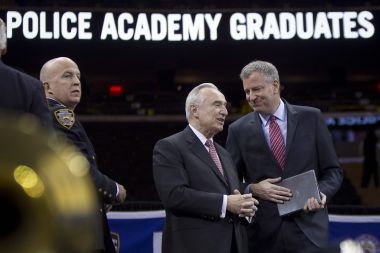Police anger at New York mayor remains, sharp fall in arrests

Police union leaders said their grievances with New York City Mayor Bill de Blasio remained unresolved after meeting with him on Tuesday, 10 days after they said he was partly to blame for a gunman's deadly attack on two policemen.
The meeting came after a marked drop in arrests across the city last week. One city newspaper said the decline was evidence of a "virtual work stoppage", but city officials were unable to say on Tuesday whether or not a police slowdown was under way.
De Blasio, whose turbulent relationship with his police department has become the gravest crisis of his year-old mayoralty, had called the meeting to "foster constructive and responsible dialogue," his press secretary, Phil Walzak, wrote in an email.
Patrick Lynch, president of the Patrolmen's Benevolent Association, who a week ago said there was "blood on the hands" of the mayor for the policemen's deaths, said the meeting had resolved nothing.
"Our thought here today is that actions speak louder than words and time will tell," Lynch said in brief remarks to reporters outside the Police Academy building in Queens as leaders from the four other main police unions stood alongside him.
The mayor has angered police by saying he understands some of the concerns of protesters who have vilified the police as being hostile to black citizens at rallies in New York City and beyond. Although he has made recent speeches filled with warm superlatives about the New York Police Department, de Blasio has also said he has often warned his biracial, teenage son about the "dangers" of police encounters.
Some police officers have taken to turning their backs on the mayor at public events in unusual displays of hostility since the two policemen were killed.
There was a marked decline in arrests and court summonses in the last week, according to statistics released by police on Tuesday. Police said they made 1,820 arrests last week, compared with 5,370 arrests for the same week a year ago, a 66 per cent drop. The number of court summonses issued for minor crimes dropped 94 per cent to 300 last week, from 4,831 over the same week in 2013, police said.
In two Brooklyn police precincts, the number of summonses and traffic tickets given out dropped from 626 in the week before the officers were killed to just one the following week, the New York Daily News reported.
The New York Post said officers in the nation's largest police department had begun a work slowdown in protest and out of fear for their safety.
City Hall and police press officials declined to answer questions on whether this was the case.
Walzak, the mayor's press secretary, later released a brief statement saying the meeting had "focused on building a productive dialogue" but gave no specific details.
Frayed relations reached a new low on Saturday, December 27, when a black man fatally shot two policemen, Wenjian Liu and Rafael Ramos, as they sat in their patrol car in Brooklyn. The shooter wrote online that he wanted to kill police officers as retribution for the deaths of unarmed black men by police, and killed himself soon after the attack.
Police Commissioner William Bratton, who joined Tuesday's meeting, has attributed some of the tension with police to unresolved negotiations on new labour contracts.
Asked about the reports of a work slowdown, Albert O'Leary, spokesman for the Patrolmen's Benevolent Association, said: "I don't know anything about that," adding that no such instructions had come from the union.
The mayor has declined to take questions from reporters for more than a week while, his office says, he focuses on trying to "bring our city together".











